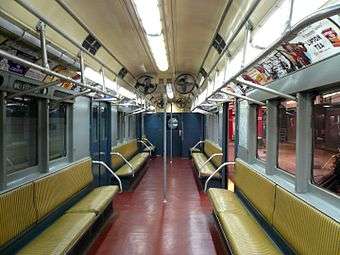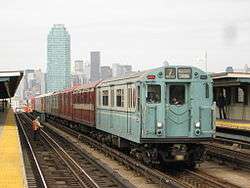R12 (New York City Subway car)
| R12 | |
|---|---|
|
R12 car 5760 on display at the New York Transit Museum | |
|
Interior of an R12 car | |
| In service | 1948-1981 |
| Manufacturer | American Car and Foundry Company |
| Built at | Berwick, Pennsylvania, USA |
| Constructed | 1948 |
| Number built | 100 |
| Number preserved | 2 |
| Number scrapped | 98 |
| Fleet numbers | 5703–5802 |
| Capacity | 44 (seated) |
| Operator(s) | New York City Subway |
| Specifications | |
| Car body construction | LAHT Carbon Steel |
| Car length | 51 ft (15.54 m) |
| Width | 8 ft (2,438 mm) |
| Height | 11 ft (3,353 mm) |
| Platform height | 3.76 ft (1.15 m) |
| Doors | 6 |
| Maximum speed | 55 mph (89 km/h) |
| Weight | 73,100 lb (33,158 kg) |
| Traction system | General Electric 1240A3 or Westinghouse J1447C |
| Power output | 100 hp (75 kW) |
| Braking system(s) | WABCO E2 "SMEE" Braking System, A.S.F. simplex unit cylinder clasp (tread) brake |
| Track gauge | 4 ft 8 1⁄2 in (1,435 mm) |
The R12 was a New York City Subway car built in 1948 by the American Car and Foundry Company. The R12 was the first post-war city-owned rolling stock for the IRT division. These cars were very similar to the R10s, except that the R12 was smaller due to A Division specifications.
Description
The R12s were numbered 5703-5802. The R12s were the first cars to feature electric door motors (as opposed to air-powered door motors).
There were two versions of the R17: Westinghouse Electric-powered cars (5703-5752) and General Electric-powered cars (5753-5802).
The R12s bore several schemes during their service lives. The cars were delivered in two-tone gray scheme with orange stripes, repainted white for the 1964 World's Fair, then a solid bright red, and finally, repainted into the MTA's silver with blue stripe scheme.
History
Delivery of the cars began in June 1948.[1] The first R12s began service on the 7 (IRT Flushing Line) on July 13, 1948. All 100 cars were delivered by October 1948.[2]
The R12s ran on the Flushing Line until the arrival of the R33WFs and R36WFs in late 1963-early 1964. The R12s were then transferred to operate on other A-division routes. One particular assignment included all GE-powered cars being heavily modified (by deactivating the dynamic brakes and cutting out the third (parallel) notch on their controllers) and sent to the 8 (Third Avenue elevated line) in the Bronx during August 1969 and running there until that route's closing on April 29, 1973. In addition, four Westinghouse-powered R12 cars (5703-5706) were slightly modified for use on the Bowling Green – South Ferry Shuttle, and were so-equipped so that the center door of each car could be opened at South Ferry, while keeping the others closed. These cars were used until the shuttle was discontinued on February 12, 1977, when the cars reassigned to the 3.
Retirement
The R12s retired and replaced by the R62s in the early 1980s. The last R12 ran in September 1981. All but 2 cars have since been taken off property to be scrapped, though several cars lasted as training vehicles or work cars for many years.
The two cars that remain today are 5760 and 5782. Car 5760 has been preserved by the New York Transit Museum since July 1972, and was repainted into its original paint scheme.[3] Car 5782 (renumbered to 35782), formerly used for fire training, is also being held for the New York Transit Museum. The car retains its MTA blue/silver livery paint scheme[4] and has been stored at the 207th Street Yard for many years. However, it is slated to receive only a cosmetic restoration; the car will not be restored to operational status.[5]
See also
- R14 (New York City Subway car) - a follow-up order to the R12s, also built by American Car & Foundry Company.
References
- ↑ "IRT SMEE delivery dates", R36 Preservation, Inc. http://www.coronayard.com/r36preservation/irtsmeedelivery.htm
- ↑ ERA New York Division Bulletin, September 2009, Page 4
- ↑ NYTransitMuseum (July 13, 2016). "Board and explore #IRT #R12 car #5760 in #DowntownBrooklyn today from 10am - 4pm!" (Tweet). Retrieved 13 July 2016 – via Twitter.
- ↑ "Showing Image 2730". Nycsubway.org. 1998-09-13. Retrieved 2012-02-10.
- ↑ mtattrain (2010-09-10). "R12 5782 & R22 7486 | Flickr - Photo Sharing!". Flickr. Retrieved 2012-02-10.
Further reading
- Sansone, Gene. Evolution of New York City subways: An illustrated history of New York City's transit cars, 1867-1997. New York Transit Museum Press, New York, 1997 ISBN 978-0-9637492-8-4



